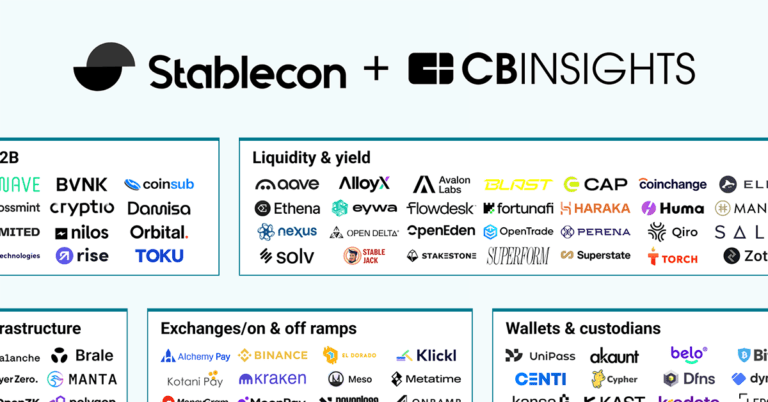
KAST
Founded Year
2023Stage
Seed VC | AliveTotal Raised
$10MLast Raised
$10M | 1 yr agoRevenue
$0000About KAST
KAST operates in the cryptocurrency and blockchain sector, offering services for spending stablecoins and crypto. The company provides digital and physical cards that allow users to spend their stablecoins and cryptocurrencies at various merchants, with integration into payment systems. KAST serves individuals who manage and spend their digital currencies. It was founded in 2023 and is based in Hong Kong.
Loading...
Loading...
Research containing KAST
Get data-driven expert analysis from the CB Insights Intelligence Unit.
CB Insights Intelligence Analysts have mentioned KAST in 1 CB Insights research brief, most recently on May 29, 2025.

May 29, 2025
The stablecoin market mapExpert Collections containing KAST
Expert Collections are analyst-curated lists that highlight the companies you need to know in the most important technology spaces.
KAST is included in 4 Expert Collections, including Payments.
Payments
3,277 items
Companies in this collection provide technology that enables consumers and businesses to pay, collect, automate, and settle transfers of currency, both online and at the physical point-of-sale.
Fintech
14,203 items
Excludes US-based companies
Stablecoin
471 items
Blockchain
9,320 items
Companies in this collection build, apply, and analyze blockchain and cryptocurrency technologies for business or consumer use cases. Categories include blockchain infrastructure and development, crypto & DeFi, Web3, NFTs, gaming, supply chain, enterprise blockchain, and more.
Latest KAST News
Sep 12, 2025
Trusted Editorial content, reviewed by leading industry experts and seasoned editors. Ad Disclosure Helius Labs CEO Mert Mumtaz ignited a fresh round of debate inside the Solana ecosystem on September 10 after floating the idea of a Solana-aligned stablecoin whose reserve yield would be redirected to SOL via buybacks or burns—either as an “enshrined” protocol feature or, more likely, through competing digital-asset treasury companies (DATs). “Warming up to the idea that Solana should enshrine a stablecoin,” he wrote, adding that “50% burn of the yield goes back to burning SOL.” Hours later, he reframed the thrust: “it shouldn’t be enshrined, a DAT should do it… fix it and trillions.” Why A Solana Stablecoin Is A No-Brainer Mumtaz’s core critique targets what he describes as “yield leakage” from Solana: “Stablecoins are commodities, and currently on Solana, there is one that captures all yield and literally funds Solana’s biggest competitor with it!” He argued that, under the US GENIUS Act, stables are readily swappable and issuers will fight aggressively for market share—citing the recent “Bachelor-style” scramble among large stablecoin companies to court business. “If you don’t want to enshrine a Solana-centric stable, then consider digital asset treasury companies (DATs)… The DAT is literally a machine for buying the underlying token.” That framing collides with the letter of the new US law. The GENIUS Act , signed in July, carves out “payment stablecoins” as neither securities nor commodities for US federal purposes, consolidating oversight largely under banking regulators and expressly separating them from SEC/CFTC jurisdiction. Multiple legal analyses and a Congressional Research Service note affirm the statute’s classification. In short: Mumtaz’s “commodity” phrasing is rhetorical, not legal. Still, the law’s most consequential economic detail—stablecoins cannot pass interest to holders—means issuers (or affiliated structures) capture the reserve income and can decide how to use it. That’s precisely the lever Mumtaz wants pointed back at Solana. Within hours, one builder publicly accepted the challenge. “We (@KASTcard) will put 101–103% of all interest income from USDK on Solana, to buyback SOL,” wrote CEO and co-founder of KAST, adding that the buybacks would sit with a foundation that issues a token after a planned TGE and that USDK would be issued with the m^0 foundation as a U.S. “Genius compliant” stable. The 1–3% kicker above 100% would be treated as marketing spend. KAST and m^0 have previously disclosed plans to launch programmable, application-specific dollars on the networl; KAST’s consumer app and card already target global stablecoin payments. The proposal’s mechanics are straightforward in concept. A native USD stablecoin accrues reserve yield (e.g., from T-bills) at the issuer level; a DAT structure then commits that income stream to buy SOL on the open market and either retire it or recycle it into ecosystem programs. Mumtaz even sketched a toy model—“Assume a Solana DAT runs a Solana stable, call it USDmanlet… [it] earns yield. The DAT takes all the yield and buys SOL with it… embed it in the ecosystem and take the yield and pump it back… or into burning SOL.” Stablecoin Wars Reach Solana Mumtaz’s “funding the competitor” barb is aimed squarely at USDC’s economics and Coinbase’s Base L2. Coinbase and Circle split USDC reserve income, a line item that has grown into a major revenue stream for Coinbase as stablecoin supply has rebounded; Coinbase incubated Base, an Ethereum Layer-2 that has quickly become a high-throughput venue for on-chain activity. None of that is nefarious—USDC’s terms are clear—but for Solana purists it is strategically suboptimal to let billions in Solana-settled stablecoin activity originate issuer profits that are then reinvested in a rival’s stack. That is the “simple problem” Mumtaz says he wants to fix, whether by enshrining or (more plausibly) by market-driven competition among issuers and DATs. Multicoin Capital co-founder and managing partner Tushar Jain agreed via X: “One of the best things about Solana’s culture is adopting good ideas from other ecosystems. Hyperliquid’s idea to encourage stablecoin issuers to buy HYPE with USDH interest is a powerful way to drive REV. Why should Circle keep all of the interest revenue from USDC on Solana?” For now, this is only a proposal—there is no SIP or governance vote to “enshrine” anything at the protocol layer, and Mumtaz himself emphasized the market-driven DAT route. Whether the proposal takes the form of competing issuers pledging buybacks, a canonical “ecosystem stable,” or a more modular treasury program, the endgame Mumtaz sketched is unambiguous: stop leaking yield, and point it at SOL. At press time, SOL traded at $228. SOL surges above the 0.786 Fib, 1-week chart | Source: SOLUSDT on TradingView.com Featured image created with DALL.E, chart from TradingView.com Editorial Process for bitcoinist is centered on delivering thoroughly researched, accurate, and unbiased content. We uphold strict sourcing standards, and each page undergoes diligent review by our team of top technology experts and seasoned editors. This process ensures the integrity, relevance, and value of our content for our readers.
KAST Frequently Asked Questions (FAQ)
When was KAST founded?
KAST was founded in 2023.
What is KAST's latest funding round?
KAST's latest funding round is Seed VC.
How much did KAST raise?
KAST raised a total of $10M.
Who are the investors of KAST?
Investors of KAST include HongShan, Peak XV Partners and nVentures Singapore.
Who are KAST's competitors?
Competitors of KAST include Fuze and 6 more.
Loading...
Compare KAST to Competitors
WageCan is a company focused on digital asset management within the cryptocurrency sector. It offers a platform for crypto debit cards that enables spending of Bitcoin, Ethereum, and various stablecoins in a secure manner. The company primarily serves individuals and businesses looking to manage and utilize digital currencies. It was founded in 2014 and is based in New Taipei City, Taiwan.

MoonPay operates as a Web3 infrastructure company that provides solutions for payments, smart contract development, and digital asset management within the cryptocurrency ecosystem. The company has a platform for individuals and businesses to buy, sell, and trade various cryptocurrencies. MoonPay serves the cryptocurrency exchange and digital asset management sectors, offering services including fiat-to-crypto on-ramps, non-custodial, and wallet support. It was founded in 2018 and is based in Dover, Delaware.
Deblock is a financial services company that integrates a current account with a non-custodial crypto wallet. The company provides a platform for users to deposit, withdraw, spend, and exchange Euros or cryptocurrencies, offering features such as an IBAN, instant transfers, and physical and virtual cards. Deblock serves individuals and businesses looking to manage both fiat and digital assets. It was founded in 2022 and is based in Paris, France.

Plutus is a financial technology company that connects traditional fiat currencies with cryptocurrencies. The company provides a platform where users can earn Pluton, a native cryptocurrency, through spending with a Visa debit card, and offers financial services, including a personal finance app and crypto wallet integration. Plutus serves the fintech and cryptocurrency sectors, targeting consumers interested in using cryptocurrency in their financial activities. It was founded in 2015 and is based in London, United Kingdom.

Ramp focuses on providing Web3 financial infrastructure within the cryptocurrency sector. It offers non-custodial services that enable users to buy and sell cryptocurrencies, facilitating the exchange between fiat currency and digital assets. Ramp's infrastructure supports businesses by integrating crypto onboarding tools, ensuring compliance, and providing a seamless user experience for transactions. It was founded in 2018 and is based in London, United Kingdom.

Transak is a global web3 infrastructure services provider specializing in fiat-to-crypto payment gateway solutions. The company offers a developer integration toolkit that enables users to buy and sell cryptocurrencies using various payment methods while ensuring compliance with local regulations. It was founded in 2019 and is based in New York, New York.
Loading...
